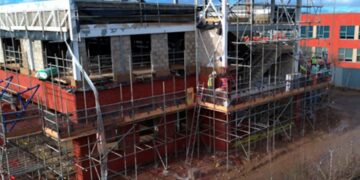The subject of what was claimed to be “botch jobs” on Wokingham roads was in the spotlight during the recent full council meeting of Wokingham Borough Council.
Peter Humphreys alleged the council had been very defensive of the so-called road repair strategy adopted by the highways department.
He said: “I would like to know if, hand on heart, you really are satisfied with their botch jobs.”
He produced images of Shefford Crescent that showed that a highways’ officer had painted an outline of a large rectangle of tarmac requiring repair, but only a fraction of it was “repaired” with a large hole in the marked zone simply ignored.
Other photos were of multiple potholes at the junction of Sarum Crecent and Crutchley Road.
“Whilst all the holes were of similar size, some were randomly marked for repairs whilst others remain, and are getting larger as vehicles scoop out the broken tarmac.
“You have previously stated that in situations like this, patching small holes is pointless as it’s a short-term fix – and that instead the whole section of failed road needs replacing.
“Clearly it has not happened. Are you content with this random, expensive, ineffective and poor-quality approach to potholes?
Due to his inability to attend, the question was answered by Cllr Stephen Conway, the leader of the council.
He said: “Naturally enough the Council, as the highway authority, has a duty to keep the highway safe.
“All our roads are regularly inspected, and we use a risk-based system to identify, prioritise and undertake repairs.
“The Council’s maintenance contractor is responsible for ensuring compliance, and is also accountable for keeping the highway safe.
“Defects identified under the risk-based policy which require immediate attention will be attended to.
“Where these can be repaired permanently in a single visit, the contractor is expected to do just that.
“Where the contractor is unable to undertake the repair in a single visit, they can plan a permanent repair but must still ensure any safety defect is made safe regardless.
“Repairs requiring road closures or more specific traffic management to undertake works will, in most cases, result in planned works.
“It is also likely that a temporary repair will be undertaken.
“In the case of Shefford Crescent, the contractor identified the need to use three-way traffic signals to undertake the repairs.
“The work was marked out, ordered and planned.
“In the meantime, the highway defects identified were temporarily made safe in accordance with our duty.
“I believe the permanent repairs at Shefford Crescent were carried out under three-way lights on August 2, which I think was probably some time after you submitted your question.”
In his supplementary question, Peter said: “I think that really highlights the inefficient way things are done because they did indeed, after my question was submitted, come back and do some more repairs, and repaired the bigger hole which they ignored at the time.
“As you see the different colours on the pictures, they come and randomly repair a couple of holes out of the two dozen that are there and then go away and come back.
“It must cost an absolute fortune to do this.
“A question I would have liked to have asked Paul (Fishwick) is, if he had got Volker Highways to repair his driveway to this standard, would he say fantastic job, here is a bonus and I will give you ten out of ten on your website as a review?”
Stephen said: “I do not think I can certainly speak for Paul, and I think it is probably best if I put you in contact with him when he is fit and well again, which I hope will be very soon.”
















































